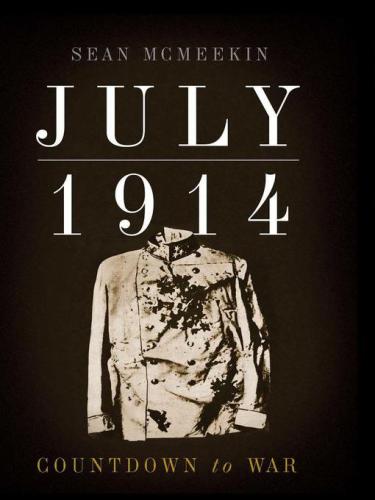
July 1914
Countdown to War
کتاب های مرتبط
- اطلاعات
- نقد و بررسی
- دیدگاه کاربران
نقد و بررسی

Starred review from January 28, 2013
McMeekin’s newest (after The Berlin-Baghdad Express: The Ottoman Empire and Germany’s Bid for World Power) is a superbly researched political history of the weeks between the assassination of Austria’s Archduke Franz Ferdinand and the beginning of World War I. Many historians believe that had Austria acted decisively in that interim, the “War to End All Wars” may have been averted. Instead, the Austrian government vacillated, finally taking decisive action after more than a month of convoluted and awkward diplomatic maneuvering. Relying on extensive research in numerous archives, as well as diaries and correspondence from key national leaders, McMeekin examines the intricacies of Austrian politics and diplomacy to explain the delay, carefully reconstructing the exploits of leading actors—particularly the Austrians and their crucial false assumption that Russia would not mobilize in defense of Serbia. Though the account is full of honest men making difficult decisions under extreme pressure, there are also numerous examples of intentional deceit, even among allies like Austria and Germany, and France and the United Kingdom. McMeekin’s work is a fine diplomatic history of the period, a must-read for serious students of WWI, and a fascinating story for anyone interested in modern history. 17 b&w images. Agent: Andrew Lownie, Andrew Lownie Literary Agency (U.K.).

Starred review from February 1, 2013
McMeekin (History/Koc Univ.; The Russian Origins of the First World War, 2011, etc.) treads familiar ground but delivers a thoroughly rewarding account that spares no nation regarding the causes of World War I, although Germany receives more than its share of blame. Historians love to argue about who started World War I. Blaming Germany fell out of fashion soon after the Armistice succeeded, replaced by an interpretation that blamed everyone, exemplified by Barbara Tuchman's classic 1962 Guns of August. Within a decade, German scholars led another reversal back to their own nation's responsibility. Russia, huge and backward but rapidly modernizing, was the key. German military leaders led by Helmuth von Moltke, chief of the General Staff, believed Russia would attack Germany as soon as it felt confident of victory and that only a preventive war could save the nation. Austrian Archduke Ferdinand's murder by a Serbian terrorist proved a godsend. Austria yearned to crush Serbia, the pugnacious Balkan nation stirring up the Slav minority in Austria-Hungary's rickety empire. Von Moltke decided it was time to set matters right since Austria's cooperation was guaranteed. Russia's refusal to stop mobilizing in support of Serbia allowed him to warn that it was about to attack and that Germany had to strike first. It did so by invading Belgium on August 4, the act that made war inevitable. Tuchman remains irresistible, and David Fromkin's Europe's Last Summer (2004) is the best modern history, but McMeekin delivers a gripping, almost day-by-day chronicle of the increasingly frantic maneuvers of European civilian leaders who mostly didn't want war and military leaders who had less objection.
COPYRIGHT(2013) Kirkus Reviews, ALL RIGHTS RESERVED.

March 1, 2013
McMeekin's sally into the ever-burgeoning genre of WWI origin stories does not refrain, as does historian Christopher Clark's The Sleepwalkers, from apportioning blame for the outbreak of the war. This can be a tricky task for historians, complicated by documentary gaps about the July 1914 crisis, which indicate some of the power players involved destroyed or doctored evidence. Historian David Fromkin (Europe's Last Summer, 2004) seized on this to indict Germany as the primary instigator of WWI. While hardly absolving Germany, McMeekin argues that the principal suspects are the Russian foreign minister, Sergei Sazonov, and the French president, Raymond Poincar', both of whom also altered evidence during the same period. McMeekin incorporates diplomatic exchanges among the powers, which both acknowledge responsibility and attempt to saddle their opponents with the brunt of it, and grants the Entente powers better success than the Triple Alliance at the high-risk, not to say cynical, operation of assigning blame for starting a continental European war. Alluding to historical controversies, McMeekin ably delivers what readers demand from a WWI-origins history: a taut rendition of the July 1914 crisis.(Reprinted with permission of Booklist, copyright 2013, American Library Association.)

























دیدگاه کاربران